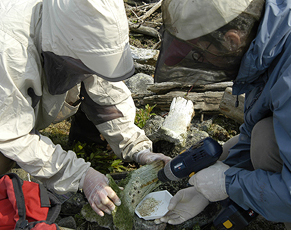


The North Atlantic right whale represents a rare case to gain insight into the factors influencing the recovery of endangered species, and how the dynamics of small populations differ from the ones based on general theory and data from larger populations. The strength of the right whale survey and sighting dataset comes from the vast amount of information that is available for such a large percentage of the species. Field studies have been ongoing for over 25 years, and the majority of individuals have been identified. This allows scientists to track the movements, behaviour, and reproductive success of individuals throughout their lifetimes. Additionally, high-resolution genetic profiles are available for approximately 75% of the species. Combining these high-resolution genetic data for such a large portion of the species, with the long-term field studies provides a powerful combination that can reveal yet unknown details about the North Atlantic right whale.

Researchers drilling into a Basque era
whale bone found along the shoreline
of Red Bay, Labrador.
The right whale genetics work that takes place in Canada can be divided into two main topics: analysis of historical samples and analysis of the contemporary population. Data from these two perspectives can then be combined to provide a context for interpreting the history, current status, and recovery potential of the species.
For the historical aspect of the research, bone samples are being collected from centuries old whaling sites in the western North Atlantic. DNA can be extracted from these bones, and using genetic techniques it is possible to identify the species of whales harvested, and obtain estimates of genetic diversity from these historic populations. Data obtained so far have largely re-written the history of the North Atlantic right whale. It had previously been assumed that Basque whalers in the 16th and 17th centuries were responsible for the most dramatic decline in right whales in the western North Atlantic Ocean.
Sixteenth-century Basque whaling sites in Quebec and Labrador.
This assumption formed the basis for the idea that this species was once abundant, and that it is capable of recovering to a large population size. However, genetic analyses of historical bones show that the Basques primarily hunted bowhead whales, not right whales, in the western North Atlantic 1. The implication is that prior to the onset of whaling right whales in had a smaller population size that has been previously thought. Therefore the recovery target for this species is likely lower than has previously been assumed.
Small samples of skin are collected from right whales
using a crossbow and a modified bolt and biopsy tip.
There are several topics being addressed based on the genetic analyses of the current population. Geneticists at Trent University are conducting parentage and relatedness analyses of all sampled whales in order to create the "family tree" for this species. This detailed information will provide crucial data for understanding the reproductive biology of this species, and to help identify the factors that are influencing reproductive success and survival. To complete this work, they are incorporating a variety of molecular markers, including mitochondrial DNA markers, microsatellite loci, markers on the Y-chromosome, and the major histocompatibility complex (MHC) - a gene family involved in self/non-self recognition and initiating immune responses. The goal of combining this suite of markers, for such a large percentage of the species, is to better understand the reproductive biology, and to assess the impact of genetic characteristics on reproductive success and survival, and therefore on the recovery of this endangered species.
*All this research is conducted in the genetics laboratory of Dr. Bradley N. White, at the Natural Resources DNA Profiling and Forensic Centre (NRDPFC) at Trent University in Peterborough, Ontario. A summary of this work has recently been published in the book, "The Urban Whale: North Atlantic Right Whales at the Crossroads" 2.

1 Rastogi, T., M. W. Brown, B. A. McLeod, T. R. Frasier, R. Grenier, S. L. Cumbaa, J. Nadarajah, and B. N. White. 2004. Genetic analysis of sixteenth-century whale bones prompts a revision of the impact of Basque whaling on right and bowhead whales in the western North Atlantic. Canadian Journal of Zoology 82:1647-1654.
2 Kraus, S. D. and R. M. Rolland (eds.). 2007. The Urban Whale: North Atlantic Right Whales at the Crossroads. Harvard University Press. Cambridge, MA.

